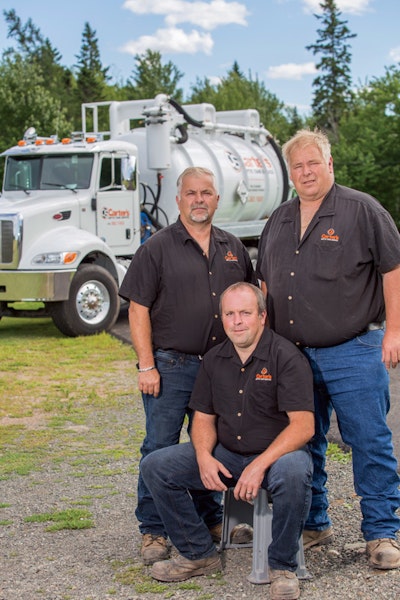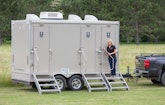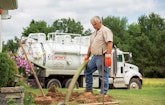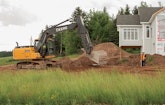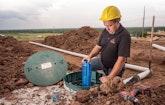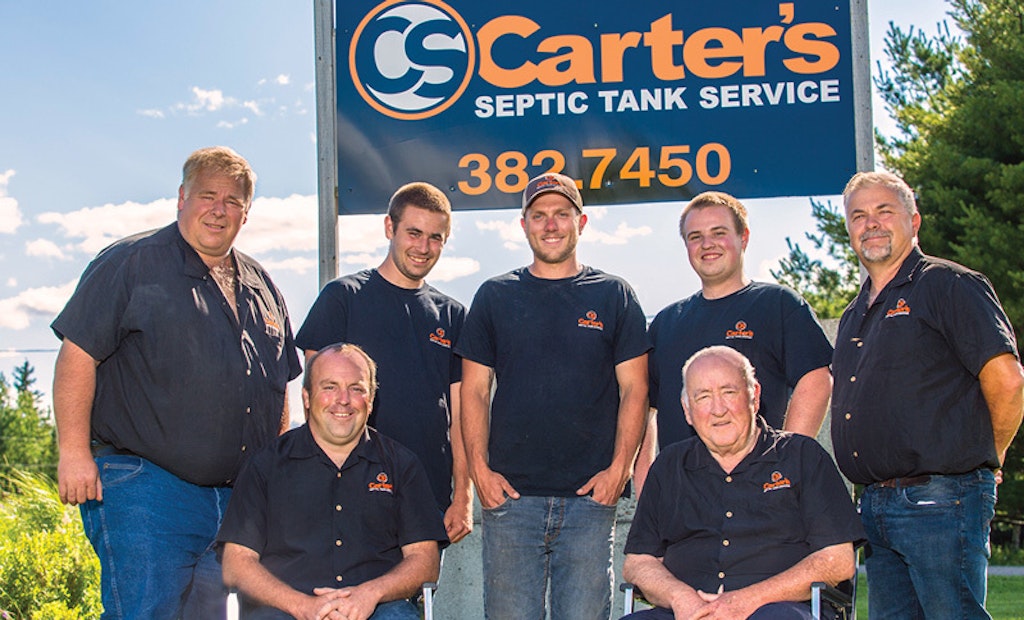
Interested in Portable Sanitation?
Get Portable Sanitation articles, news and videos right in your inbox! Sign up now.
Portable Sanitation + Get AlertsCarter’s Septic Tank Service Ltd. has been operating out of Second North River, New Brunswick, Canada, since 1960. Always looking for new opportunities to grow, the three Carter brothers — Brad, Wayne and Jason — live by one motto: “If you grow stale, you die.”
The business was started by their father, Wayne, and uncle, Waldo Carter, on the backbone of septic pumping. Their uncle passed away in 1978, leaving their father to operate the business on his own.
“My brother Wayne and I had been helping my dad since we were 5 or 6 years old, so we gradually grew into the business,” says Brad Carter. “We bought the business from my dad in 1990. We had bigger plans to move into industrial vacuum work, expand portable toilets and septic, expand our pumping offerings and do more water and sewer hookups for construction contractors.”
The plan worked from the get-go.
The company started hiring within months and brother Jason joined the company a few years later. Today, the company employs 27 people. A satellite office in Shediac about 25 miles away employs two. Pumping and jetting make up about 35 percent of the business. Portable restrooms represent 20 percent. The remaining 45 percent is excavation, construction, septic installation and lateral relining.
The brothers have specific responsibilities: Brad takes care of septic pumping, liquid waste, portable restrooms and pipe patching; Wayne is responsible for construction, excavation and new septic system installs; and Jason is responsible for the fleet, including the in-house maintenance shop.
“We have our little scuffles, but each of us knows our place and we don’t doubt each other’s decisions,” says Carter. “We realize that not everything you invest in will make money, but that each of us is doing our best for the business.”
A FIT FLEET
The main vacuum fleet is made up of six trucks, all with steel tanks: a 2015 Peterbilt 345 with 3,850-gallon tank and Fruitland pump built out by Imperial Industries; a 2016 Freightliner and 2009 International with 3,850-gallon tanks and Moro pumps from Cusco; and a 2001 Sterling Acterra, with 3,600-gallon tank and Moro pump from Cusco. Rounding out the fleet is a Vactor 2100 combo unit mounted on a 1999 Ford L8000.
The company promotes the use of BioClean (Statewide Supply) for septic tank maintenance.
“We realized early on that we would go stale if we relied only on septic pumping,” says Carter. “You can only grow so big on that and there’s a big slowdown in winter when we have maybe 10 septic pumping jobs in a week. To keep busy, we have a policy of attempting to pump almost anything at least once. We pump everything from toxic liquids to grease traps, gasoline and fuels, waste oil and oil spills, and caustic soda. We’ve pumped gravel from drain systems, removed blown insulation from attics, and beer from the floor drains of a local brewery.”
However, Carter’s no longer offers to pump fly ash, which never settles in the tank and clogs filters.
Handling the pumping of toxic materials requires additional certification for employees and also requires the inside of waste tanks to be steam-cleaned between off-loads.
The portable restroom business has grown significantly over the years from a small inventory of 20 and now employs two operators full time. Contracts are about 70 percent construction with events and smaller government contracts making up the rest.
RESTROOM INVENTORY
Carter’s current lineup of restrooms includes 300 standard portables, 20 flushing with sinks and 10 wheelchair-accessible units, all from PolyJohn Canada. They’re transported by two trailers: a 22-unit made by Linkletter’s Welding Ltd. and a 10-unit by McKee Technologies - Explorer Trailers. In addition, the company offers eight restroom trailers — six Rich Specialty Trailers, one from Room To Go and a new five-station unit from Comforts of Home. Two portable shower units are from PolyPortables. PolyJohn Canada also provided six hand-sanitizing stations and 20 stand-alone sinks.
“We bought our first washroom trailer five years ago after my wife talked me into it,” says Carter. “A few day after delivery, one of my competitors rented it from me for a long weekend in May, and then his client wanted to rent it from me until the end of September. We’ve had solid demand for trailers in this market — they’re out all of the time. After five years we convert the special event trailers into construction trailers.”
Three delivery vehicles also provide waste service, all with steel tanks and Elmira Machine Industries / Wallenstein Vacuum pumps: a 2012 Chevy 1-ton with 420-gallon waste/240 freshwater tank from Vacutrux; and a 2011 Chevy 1-ton with 300-gallon waste/180 freshwater tank from Vacutrux. A 2008 GMC Topkick with SwapLoader variously hauls a 600-gallon freshwater/300 waste tank by Vacutrux, a polyethylene 1,200-gallon potable water tank, a dump body, and a salting unit to assist with snow removal work in winter.
Bathroom tissue and hand soap are both supplied by Wood Wyant and deodorizers are Green Way Products by PolyPortables.
The company’s largest event was the FIFA Women’s World Cup Canada 2015 held in Moncton. The job required three or more services a day for 17 days on 160 units, six washroom trailers and two shower trailers. For this and many other events, Carter insists on keeping staff on site to ensure the units are kept spotless.
The company works co-operatively with competitors outside of its service area and in neighboring provinces on jobs too large for just one contractor. Carter says he met many New Brunswick contractors for the first time at the Water & Wastewater Equipment, Treatment & Transport Show.
ONSITE WORK
The construction business continues to grow organically from the company’s first forays into septic tank construction. On the installing side, 60 percent of the work is conventional septic systems, and 40 percent involves advanced systems. For installation work, Carter’s relies on concrete tanks from Casey Concrete and risers and lids from Polylok.
Septic construction work led to general excavation, full build-outs of sewer and water connections and even related sales of sand, stone and gravel.
The excavation fleet includes: two Caterpillar 420D backhoes; two Case 850E dozers; two Hitachi excavators, a 160 and a 225; a John Deere 160 excavator; a Case CX50B mini-excavator; four Volvo L60 loaders; and a JCB skid-steer. Dump trucks include a 2016 Western Star Twin-Steer; a 2014 Western Star tandem; a 2006 Sterling tandem; and two Freightliners — a 2011 and a 2013. Dump trailers include: a 2012 Peterbilt tandem; a 2011 Peterbilt tri-axle; a 2010 Western Star tandem; and a 2007 International tandem.
A 2012 Peterbilt with an 8,400-gallon KROHNE stainless steel tank delivers water for various residential and commercial customers.
A BUSY SHOP
The in-house service shop overseen by brother Jason employs a full-time mechanic who works afternoon shift from 4 p.m. to midnight.
“That keeps more equipment on the road during the day,” says Carter. “During the summer we handle most regular maintenance, but during the winter we will handle anything from transmission replacement to changing out an engine. That keeps a couple of our regular guys on the payroll and helps keep up morale.”
Carter’s also jets and relines sewer laterals using the PipePatch (Source One Environmental) epoxy resin cured-in-place liner system.
“We use a camera from General Pipe Cleaners to scope the damage and then insert the bladder,” says Carter. “When a construction company broke a lateral in town last year they expected it would take road closure and two days worth of excavation to fix it. We repaired it without road closure in two hours.”
For root-infested laterals, the company has recently begun offering RootX, a chemical treatment to soften and dissolve roots prior to flushing and jetting.
GETTING THE WORD OUT
The company commits to a substantial advertising and promotion budget. Carter says that phone book advertising still works for the business, although the ad has prominent placement — the full back cover of the directory. The company website and Facebook page are also big draws.
“We’ve tried newspaper and radio, but we weren’t getting the bang for the buck that we expected,” he says. “Our three best promotions are word-of-mouth, the name painted on our company trucks and our employees.”
The company is an active member of the New Brunswick Association of Onsite Wastewater Professionals. “If you’re not on top of the changes in the industry, your business will lose touch with the market,” says Carter.
The Carters regularly attend the WWETT Show to make new business connections and learn about new technologies and equipment. “When people ask how I can justify going to the show, I tell them I don’t understand how they can justify not going to the show,” says Carter. “When I leave I’m excited to go back to work and try out some new ideas.”
Carter says the business remains eager to explore new options for growth.
“It’s too easy to say ‘no’ to a customer,” he says. “We’ll never turn down an opportunity to do something new or challenging or different.”
Paying attention to retention
The owners of Carter’s Septic Tank Service Ltd. in New Brunswick, Canada, pride themselves on a solid record of employee retention. Among its 27 employees, seven have been on the company payroll in excess of 25 years.
“Rewarding our employees well for what they do is part of our business plan,” says Brad Carter, one of three brothers who own the company. “A business doesn’t make money on its own — it’s the employees who are making money for the business. Heavy staff turnover is not only disruptive to the business, but requires a company to needlessly divert resources to training and retraining. We have a turnover rate of maybe one staff person per year.”
The company offers employees an optional pension plan. If they agree to deduct 5 percent of their salary from each paycheck, Carter’s will match it. While the provincial government’s health care plan provides medical coverage for all residents, the company will pay half the cost of an optional private medical plan that covers eye care, dental care and prescription drugs.
“The pension plan and medical coverage is completely optional,” says Carter. “Not all of our employees choose to enroll, and they appreciate being able to make that choice themselves.”
Carter notes that too many businesses build success for their owners while expecting employees to simply scrape by.
“If we’re successful we want to be generous to our employees so that they’re also successful,” he says. “When one of our employees comes home at 9 o’clock at night after putting in some extra hours, we want their families to feel good about the fact that they’re being rewarded for their effort.”
